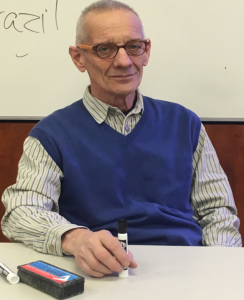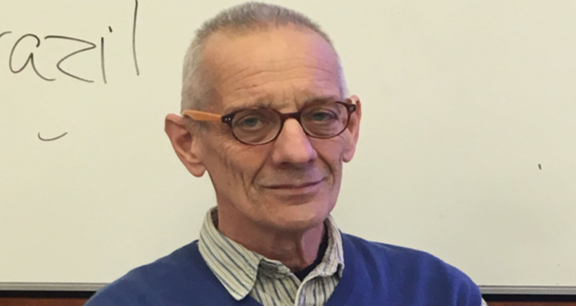By Jacqueline Escobar
Staff Writer
Associate Professor of Italian and French, Marco Codebo, encourages students who want cultural diversity on campus to take Italian. In the fall, Codebo will teach a new course, ITL 72 “Contemporary Italian Culture through the Lens of Fashion.”
“This class will explore the ramification of fashion, a highly important business in Italy today,” Codebo said about the class.
Codebo started as an associate professor of Italian and French at Post in September 2018. He also teaches French and Spanish, but said, “Italian remains my primary field.”
Codebo was born in Genoa, a city in northern Italy; he values his hometown’s significance in the middle ages. In the sixteenth and seventeenth centuries, it became one of the financial capitals of Europe, as Genoese bankers loaned money to kings and princes. Codebo moved to the United States 25 years ago, after teaching Italian in many high schools.
Codebo shares his past experiences in Italy with his students. “I feel like I am sharing something important, something that comes from a thousand year long history, and I like this feeling,” he said.
“I left when I got a job as a lecturer of Italian at UCLA; it was a position entirely funded by the Italian government as part of a program that supported the teaching of the Italian language and culture around the world,” Codebo said.
After a few years in Los Angeles, he was admitted to the graduate program in comparative literature at UC Santa Barbara. In order to attend, Codebo commuted from Santa Barbara and LA, where he also had to juggle making a living for his wife and two children. “I took a little longer than expected, but I finished my PhD in 2005,” he said.

Marco Codebo associate professor of Italian and French
Codebo believes that learning about a foreign language and a different culture is lucrative in the job market.
“I think this gives students a unique skill; I mean this not only from a cultural point of view, but also from a practical point of view; the best skill you need today, when work or doing business, is flexibility. Nothing can give you more flexibility than putting yourself in somebody else’s shoes, and this is what you do when you try to speak another language or learn a foreign culture,” Codebo said.
“In my classes, I happen to teach Italian to students who want to be able to talk to their grandparents or to help students learn the culture of their ancestors,” Codebo added.
Codebo also teaches ITL 18, a first-year seminar course on contemporary culture in Italy. This class studies three areas of Italian life: the family, organized crime, and migrations from and to Italy.
“My teaching materials include works created through both textual and visual media: a novel, movies, YouTube videos, and newspaper articles. I taught this class [ITL 18] in the fall semester, and I am teaching it this spring; All in all, I am quite pleased with the way students respond to this class and to being exposed to a foreign culture,” he said.
Although Codebo is grateful to help his students have a better lens of culture, he is concerned about the Italian program at Post.
“In the past years, the enrollment in the Italian classes has been down,” he said, for “numerous reasons.”
Yet, Codebo is optimistic that the Italian program will flourish and believes that having a strong Italian program “is an asset for this University.”
The program is important to the Italian American community, “a community that has historically sent a lot of its young members to this campus,” he said.
“We just need to work together to keep this program alive; it should not be an impossible feat,” he said.




Be First to Comment